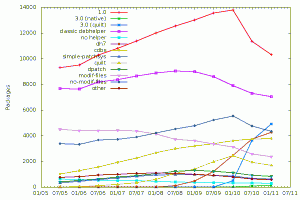I’ve been playing with snapshot.d.o, which is a fantastic resource to look at how Debian has been changing over the years.
Below are some preliminary results about various aspects of source packages: format, packaging helpers, and patch systems.

For clarification:
- “modif-files” indicates packages that do not use a patch system, but modify files outside debian/.
- “no-modif-files” indicates packages that do not use a patch system, but do not modify files outside debian/.
- “other” is “everything else”. Like packages using dpatch, but still modifying some files outside Debian. Or using both dpatch and quilt. (yes, some packages do that).
Random comments:
- People have been moving away from simple-patchsys and dpatch to quilt since 01/2009 (their usage has been decreasing since then). It seems that discussing the introduction of the new package formats was enough to make people move away from dpatch, even if the 3.0 (quilt) was not usable yet. We now have less than 1000 packages still using dpatch or simple-patchsys. Can we get rid of them all for wheezy? It would be nice to standardize on quilt.
- The growth of the 3.0 (quilt) format is impressive. Its adoption is much faster than the adoption of dh7. That surprises me a lot, since I had the impression that more people were unhappy about 3.0 (quilt) than about dh7.
- The number of packages with no packaging helper, but no modified files outside debian/ is dropping. Either than means that we are patching upstream more and more (unlikely), or that means that people are switching to 3.0 (quilt) even if they have no patches, probably due to the other benefits! Could this mean that we could standardize on 3.0 (quilt) and 3.0 (native) for wheezy or wheezy+1?
- The number of packages that modify files outside debian/ without using a patch system has been constantly dropping since 2005.
- dh7 is not a cdbs killer. While it seems to be the cause for a huge drop in “classic debhelper” packaging, the number of packages using cdbs is still progressing.
If you have other ideas of things to investigate using snapshot.d.o, don’t hesitate to ask in comments.